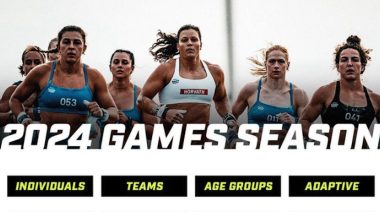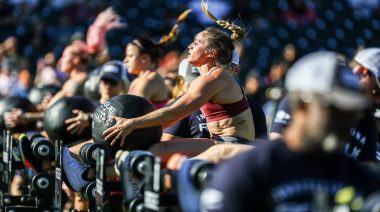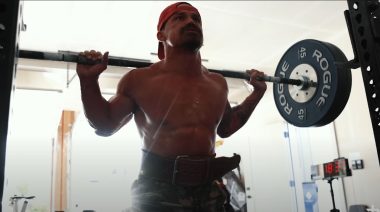Someone asked me how I would program an 8-week CrossFit cycle and I had to say, I wouldn’t. Frankly, I prefer 12, 14 or 16-week programming blocks because I think 8-weeks is just too short to create some meaningful impact.
Someone asked me how I would program an 8-week CrossFit cycle and I had to say, I wouldn’t. Frankly, I prefer 12, 14 or 16-week programming blocks because I think 8-weeks is just too short to create some meaningful impact.
Having said that, I probably have 3 solid 12-week training blocks left before my athletes have to start competing in the CrossFit Open at the end of February, 2022. So, I think it is worth looking at some general planning guidelines.
CrossFit Progressive Training Blocks
When I think about training cycles in CrossFit, I think about a matrix that can get very complicated if you are not familiar with two things:
- Your audience, the people who are going to be doing your workouts, whether they are members of your gym, or individual clients
- The measure of the baseline activity across a number of goal-oriented factors
What I am looking for is a cycle that deals with strength, efficiency, endurance, recovery, capacity, and stability. I don’t neglect any one of these goal-oriented factors in designing a training cycle, even if focus is on one in a particular period. For example, we may have a greater emphasis on strength over endurance in one cycle.
In CrossFit, there are so many things we can focus on. But, you can create a progression that can keep you on top of everything. You can start a first cycle that is quite basic, strength and gymnastics.
I like to program strict work, getting athlete’s progressively stronger, building up the lifts in weightlifting, and the endurance work in this cycle is going to be long. Then, the next cycle may be barbell cycling because you have built strength in the first cycle and now you can apply it in a dynamic situation.
Same with gymnastics, you have developed skills and strength to do the movements in the first base cycle, and in the second cycle, I am getting you to do more dynamic gymnastic work. So, instead of strict pull-ups, you are doing kips. And, I am now adding weekend 3-mile zone runs, for example.
We get to cycle three and I am moving into more of everything, essentially prepping athletes for the CrossFit Open. There are higher volumes of barbell cycling, weightlifting, gymnastics cycling and higher reps all around.
So, I may have an EMOM for endurance followed by an AMRAP of two movements from the EMOM to simulate how an Open workout feels. The program is now building on top of itself.
I make sure that everyone at Precision CrossFit can see where we are on the calendar, where we are going, and what the goals are for each cycle. I am doing baseline tests and end of cycle tests to see how we are progressing.
It’s pretty elaborate and if you look at my programming spreadsheets, they are very detailed and specific with tiers of exercise blocks sitting on top of each other, following on from one another within the time allotted.
CrossFit Goal Setting for Everyone in the Gym
CrossFit is a really good supplement for a lot of different sports methodologies. I try not to get too wrapped up with the sport of CrossFit.
I have trained obstacle course racing (OCR) champion Hunter McIntyre, and used CrossFit to help him get better at OCR. So, for this particular athlete, CrossFit is a great way to develop his engine for strength and running.
For a High School cross country team, you can use Murph with push-ups, sit ups, and air squats as a baseline for them. As a coach if you begin to see their times come in under 30 minutes on this workout, they are probably going to do really well in a 5K cross country race. It is a lot easier to do that 5K then it is to do Murph.
For any coach or athlete, I say, CrossFit should be a must-have in your training toolbox. It is essentially the evolution of circuit training and the reaction is overwhelmingly positive for athletes because it is challenging and fun.
So, they may be doing CrossFit two or three days a week as a supplemental workout and it will be enough to prepare them for whatever sport they are doing.
On the other hand, a lot of people who are coming to my gym, Precision CrossFit, they’re looking for CrossFit pure and simple, and most everyone wants some element of competition because their goal setting is based on their performance in WODs and their personal improvement. For a select few, that personal improvement is part of their journey into competitive CrossFit as a sport.
The great thing about programming training blocks is that the fundamentals of the workouts, the movements, the sequences, they don’t change, and you may adapt reps, times, and weights, but you are always doing CrossFit.
If you have a gym or are a coach who wants to learn more about programming or needs some help on your own specific needs, feel free to DM me on Instagram, @mtromello.
CrossFit programming isn’t about just doing any old set of movements every day and knocking yourself out without some progression. I build programs for my gym and my affiliate gyms based on blocks that improve performance but also emphasize the preparedness that CrossFit demands of athletes.
In other words, you have a plan to train your athletes to be ready for anything. You just don’t do anything to get them to that point.






